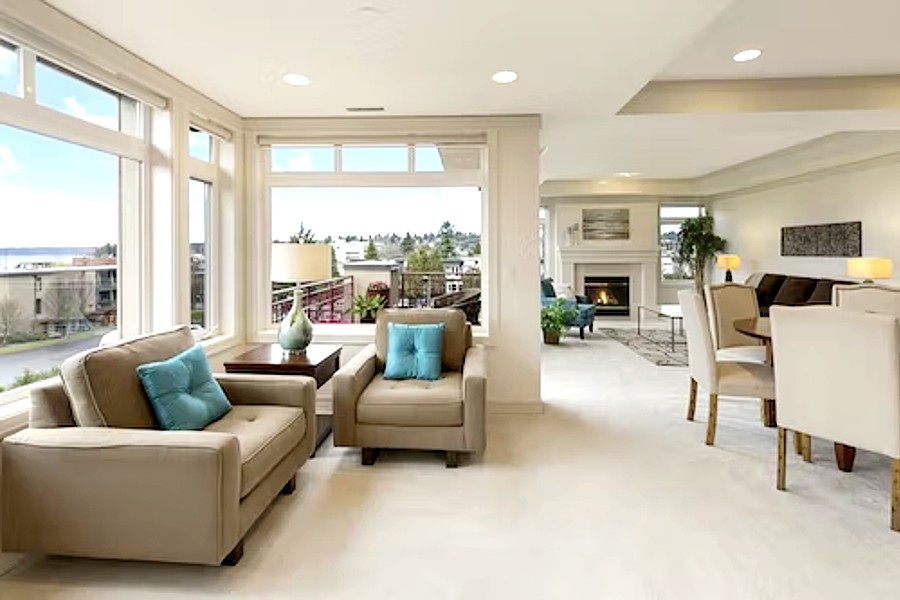
When designing a home, it is easy to overlook the importance of windows in making your house comfortable and sustainable.
Windows are not just for providing daylight or ventilation; they can be used to control the temperature of a building while decreasing energy costs. With rising concern over climate change and energy efficiency, windows have become critical in achieving a sustainable home. By selecting the right window types, materials, and placement, homeowners can significantly reduce their energy consumption, decrease their carbon footprint, and save money on their energy bills.
Here are tips on using your windows for a healthier and more environmentally friendly living space.
1. Choose Energy-Efficient Windows
Opt for windows with a high energy efficiency rating, such as double or triple glazing, low-emissivity coatings, or gas fills. By choosing low e windows, you can reduce heat loss in the winter and keep your home cooler in the summer. The low-e coating works by reflecting heat into your home in the winter, keeping it warmer and reducing the need for heating.
Energy-efficient windows come in various styles and materials, such as double or triple glazing, low-emissivity coatings, or gas fills. These windows can help to reduce heat loss and prevent drafts, keeping your home comfortable year-round. They can also reduce outside noise and filter out harmful UV rays, protecting your furniture and interior decor from fading.
2. Consider Window Placement
The orientation of windows can impact how much sunlight and heat enters your home, affecting its temperature and energy consumption. For example, south-facing windows can provide ample natural light and warmth in the winter, while west-facing windows can cause overheating in the summer. By carefully considering the direction of their windows, homeowners can create a more energy-efficient and comfortable home.
To maximize the benefits of window placement, homeowners can use shading devices such as blinds, curtains, or shades to regulate the light and heat entering their homes. These devices can help to block out the sun’s rays in the summer, reducing cooling costs while allowing more light in the winter, reducing heating costs.
3. Use Natural Ventilation
Natural ventilation through windows is an effective way to keep your home comfortable and reduce energy consumption. By opening windows in the early morning or evening, when the air is cooler, homeowners can allow fresh air to enter their homes, reducing the need for mechanical systems like air conditioning. Natural ventilation can also improve indoor air quality by reducing the build-up of pollutants and allergens, creating a healthier living space.
Homeowners should ensure their windows are in good condition and can be opened and closed easily. They should also be aware of any outdoor sources of pollution or noise that may impact indoor air quality.
4. Use Window Coverings
Window coverings such as blinds, curtains, or shades are essential in creating a comfortable and sustainable living space. For those with beautiful roof lanterns, special roof lantern blinds can be a fantastic addition, offering all these benefits while preserving the unique character of your space. These coverings can help regulate the light and heat entering a home, reducing energy consumption and creating a more comfortable living space. They can also provide privacy and reduce glare, making your home more enjoyable to spend time in.
When selecting window coverings, homeowners should consider their energy efficiency and how they affect indoor air quality. For example, blackout curtains can provide excellent insulation against winter heat loss and excessive summer sun exposure. Similarly, cellular shades can also be used to regulate light and heat levels while filtering out harmful UV rays.
5. Maintain Your Windows
Regular maintenance of windows is crucial in ensuring their longevity and energy efficiency. Over time, windows can develop leaks or drafts, reducing their insulation properties and increasing energy consumption. Regular cleaning and inspection of windows can help homeowners identify and address any issues before they become more severe.
Homeowners can perform basic maintenance tasks such as cleaning the glass, lubricating hardware, inspecting seals, and weatherstripping. They can also hire a professional to perform more extensive maintenance, such as replacing damaged frames or glass.
6. Consider Passive Solar Design
The passive solar design effectively uses the sun’s energy to heat and cool your home. By orienting windows, walls, and other surfaces in a particular way, homeowners can use the sun’s rays for free heating and cooling. This technique can also reduce the need for mechanical systems such as air conditioning or heating, reducing energy consumption.
When planning passive solar design, homeowners should consider the orientation and size of windows and any shading or reflecting surfaces that may be used to regulate light and heat levels. They should also consider the climate and seasonal weather patterns in their area so they can make the most of the sun’s available energy.
By following these tips, homeowners can make the most of their windows and create a more energy-efficient home. By carefully selecting and placing windows and using window coverings, homeowners can reduce energy consumption and save money on their heating and cooling bills. In addition to increasing energy efficiency, these steps can improve indoor air quality and create a healthier living space.
Become a Harlem Insider!
By submitting this form, you are consenting to receive marketing emails from: Harlem World Magazine, 2521 1/2 west 42nd street, Los Angeles, CA, 90008, https://www.harlemworldmagazine.com. You can revoke your consent to receive emails at any time by using the SafeUnsubscribe® link, found at the bottom of every email. Emails are serviced by Constant Contact








